Patrick P. Coll, M.D.
Germine Soliman, M.D., M.S.
Yazeed S. Maghaydah, M.D., CMD, FACP
George A. Kuchel, M.D. C.M., FRCP, AGSF
Written by Steven Blackburn
Drs. Germine Soliman, Yazeed S. Maghaydah, Patrick P. Coll and George A. Kuchel can attest that the recent relocation of the UConn Center on Aging accomplished so much more than just moving into a larger building with better parking down the road from UConn Health’s main campus. The effort led to an increase in the institution’s already impressive number of geriatrics providers. In addition, it brought other providers focused on the care of older adults from other disciplines, initially spread across UConn Health’s campus, under one roof. The result now provides adults aged 65 and older suffering from a variety of medical conditions the ability to receive coordinated, high-quality geriatric care within the Geriatrics and Healthy Aging program. It has been described as a one-stop shop by Dr. Kuchel, the center’s director.
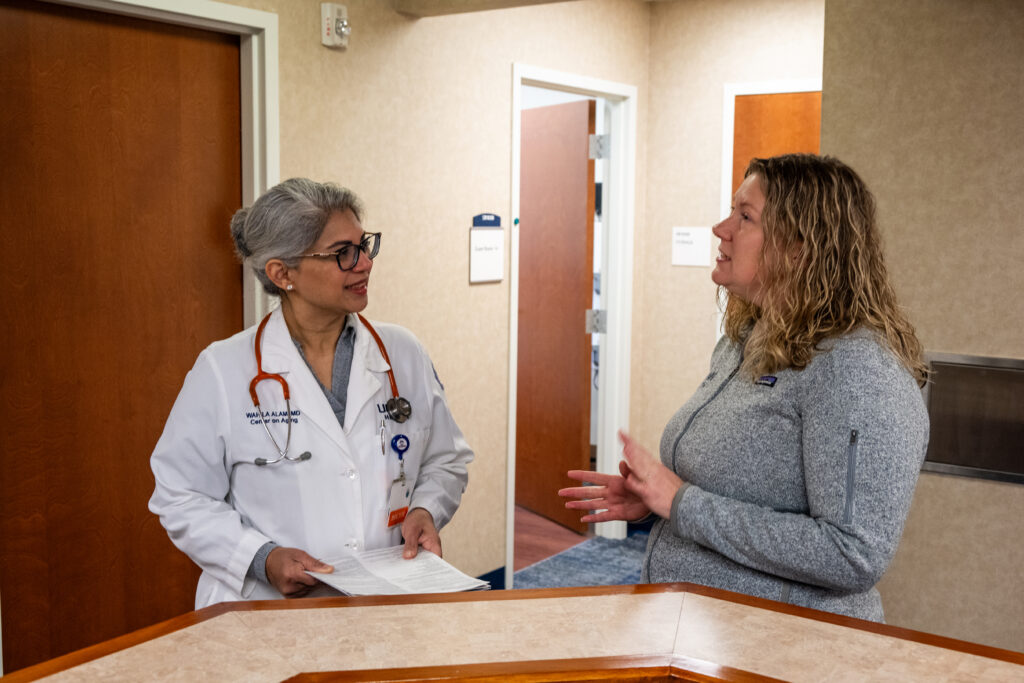
“We believe that this is the first clinic of this kind in this region of the country,” said Dr. Kuchel, who came up with the idea for the center with Dr. Patrick P. Coll, the medical director for senior health and chief of geriatric medicine. “And as best as we can tell, there is also no such example elsewhere in the northeast.”
What Dr. Kuchel can say with certainty, however, is that UConn Health is home to one of just 15 Claude D. Pepper Older Americans Independence Centers (OAIC) nationwide recognized by the National Institute on Aging (NIA) for their excellence in geriatrics research and research career development. Dr. Kuchel also knows that UConn Health has one of the largest geriatric practices in the country. Most centers of UConn Health’s size have about one or two geriatricians on staff. The UConn Center on Aging employs 12 certified geriatric physicians, to grow to 13 this summer, and three certified geriatric APRNs. These numbers are the exception nationwide. Fewer than 1 percent of all physicians in the U.S. are board-certified geriatricians, according to the American Geriatrics Society.
Now, the work of UConn Health’s certified geriatricians and multiple board-certified geriatric psychiatrists is enhanced at Geriatrics and Healthy Aging by UConn Health’s Endocrinology Division, which treats diseases such as osteoporosis, Urology Division, which is there for urinary incontinence care, and Vascular Surgery Division. UConn Health’s James E. C. Walker Memory Disorders Program and its multidisciplinary team of providers, including geriatric psychiatry and medical social work, have also relocated to this new space. Audiology and podiatry will be added soon.
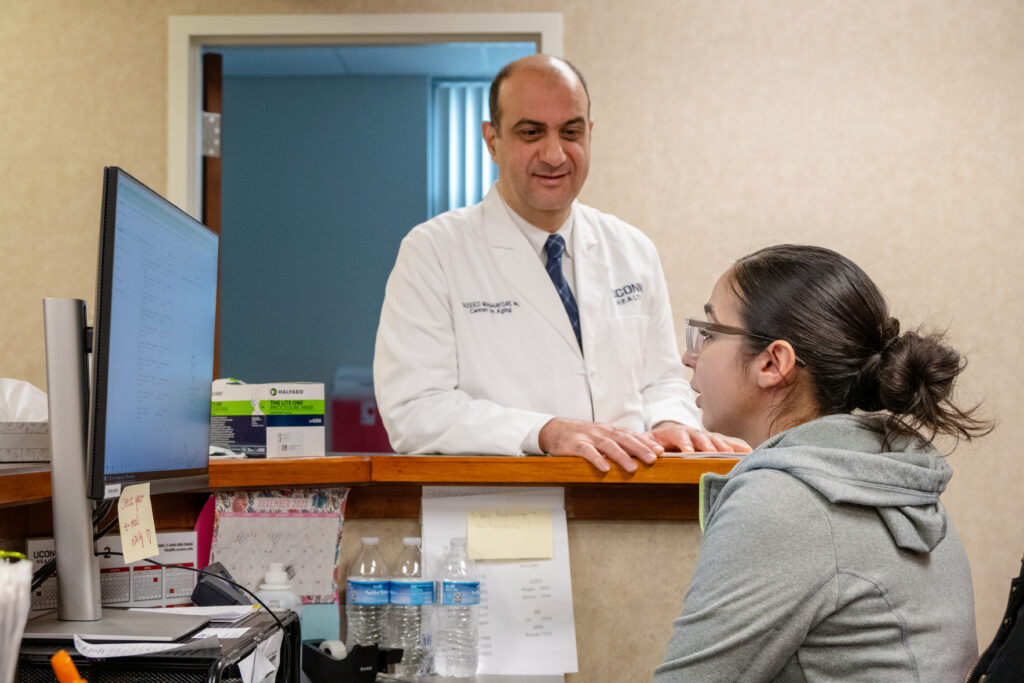
Addressing a Nationwide Problem For Aging Adults
Drs. Kuchel and Coll’s idea for what would become known as Geriatrics and Healthy Aging was driven by the fact that most older adults in the U.S., especially those with complex medical and psychosocial concerns, are forced to see multiple providers in different locations. This fragmented system does not adequately meet their needs and the needs of their caregivers.
“Having different disciplines working in the same space promotes coordination of care between the providers and facilitates scheduling patients for visits with more than one provider in the same session,” Dr. Coll said. “Many of our patients need help with transportation to medical visits, and many of them are accompanied by family or caregivers. Coordinated scheduling is efficient and convenient for patients and those who accompany them on their appointments.”
As Dr. Kuchel noted, any individual older patient might be seeing up to a dozen providers at a time. On one hand, coordinating these appointments can turn into a full-time job that usually falls on patients’ children. Geriatrics and Healthy Aging helps decrease the amount of time and effort patients’ children must take to ensure their parents receive treatment. But, more importantly, the Center on Aging addresses another major issue that arises from the current healthcare system. Communication between providers can be less than optimal, and they usually are more focused on one disease or organ rather than looking at the whole person to help identify how they interact or affect each other. This can create many complications.
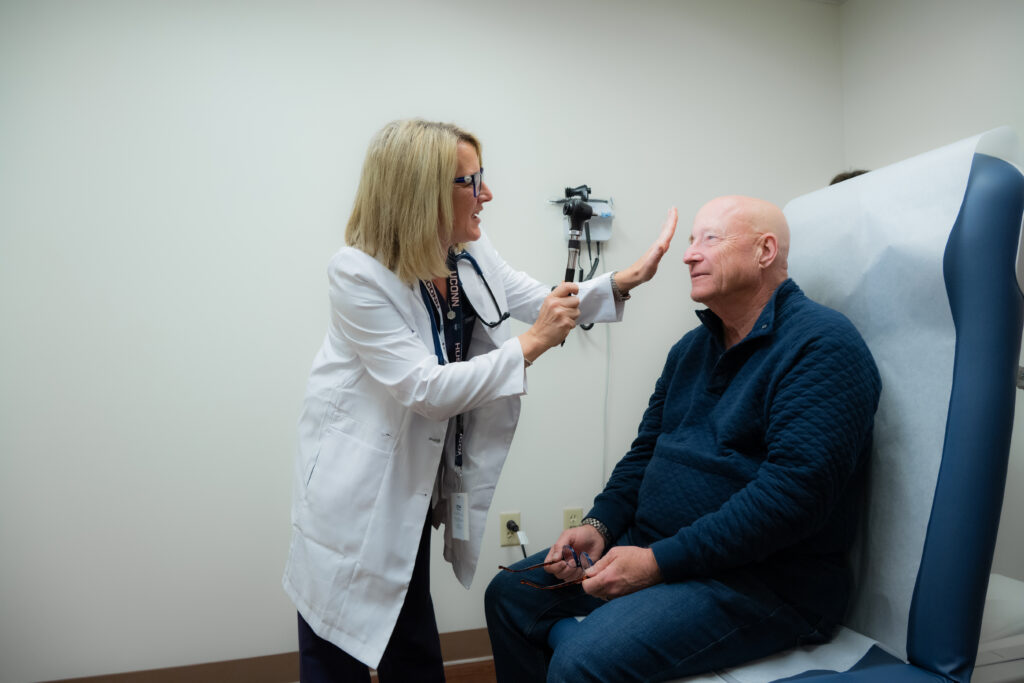
“We don’t want to be in a situation where we are giving conflicting advice,” said Dr. Kuchel. “There are examples where a decision to help one problem can actually make another issue worse. Or patients may have to confront decisions involving risk factors or different considerations that influence how they age and whether they are able to remain independent. Physicians need to both be aware of and be able to communicate these competing risk factors to their patients to see which outcomes are the most important to them and in that way help patients and their families make fully informed decisions.”
This is only possible through streamlined communication. As a result, Geriatrics and Healthy Aging not only provides a one-stop shop for patients but strives to coordinate care with other providers. “We want to not only improve how we deliver and develop care for each individual patient, but want to improve communication between providers as well,” added Dr. Kuchel.
One of the primary goals of Geriatrics and Healthy Aging is to improve the quality of life for older adults. “In the Farmington Valley, many older adults live independently, so maintaining a high quality of life and avoiding the need for residential long-term care is a priority,” said Dr. Kuchel. “I have yet to meet someone who actually wants to move into a nursing home.”
Divisions Collaborate to Provide Unrivaled Holistic Care
Cancer risk increases with increasing age. Approximately 60 percent of the patients who receive care at UConn Health’s Carole and Ray Neag Comprehensive Cancer Center are over 65 years old. Moreover, studies have shown that patients over 65 years old with cancer who received a comprehensive geriatric evaluation had a 20 percent lower risk of toxicity from cancer treatment when compared to patients who did not, had fewer falls and received fewer unnecessary medications. Bringing oncology and geriatrics together just seemed natural.
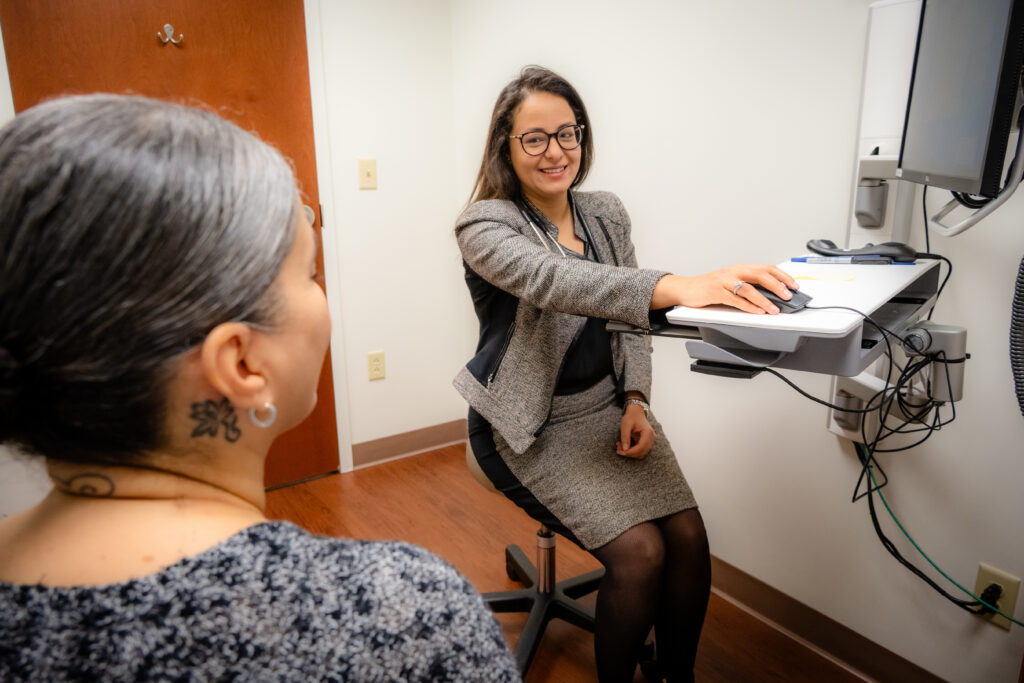
“The geriatrics clinic in the cancer center space promotes optimal care for older adults contemplating or receiving cancer treatments,” commented Dr. Germine Soliman, director of the Geriatric Oncology Co-Management Program. “The comprehensive assessments we perform are done in a timely manner to avoid treatment delays. There is an emphasis on physical, cognitive and psychosocial factors that might impact both the choice of cancer treatment and a patient’s response to cancer treatment.”
There is a special emphasis on optimizing the patient’s overall health, including nutrition, strength, psychological health, social support, sensory impairment and the management of existing co-morbidities.
The new location is advantageous when it comes to dementia care, said Dr. Yazeed Maghaydah, co-director of the James E. C. Walker M.D. Memory Assessment Program, noting that patients with dementia often have other chronic conditions.
“Acute confusion is a complication of dementia, especially in advanced stages. At the same time, it could be a sign of an acute medical problem, such as infection, change in metabolic/kidney function, or medication interaction or side effects,” Dr. Maghaydah said. “It is very stressful for families and caregivers, and many cases end in the emergency department, where patients get stressed and sometimes unnecessary testing may be done. Being able to see the patient in the clinic, coordinate with social services and the primary care provider, and do lab testing all in the same place is a win for everyone. This provides comprehensive evaluation, accurate diagnosis and support to families and caregivers, and may help save the patient a trip to the hospital.”
Dr. Maghaydah noted that a geriatric psychiatry provider is there daily, as well as a designated clinical social worker who can both meet with patients and families during their visits and facilitate communication with providers.
“The name of Geriatrics and Healthy Aging was very deliberate,” concluded Dr. Kuchel. “We very much wanted ‘geriatrics’ in there because the core of what we do is helping those aged 65 and older who are dealing with chronic conditions. But, at the same time, we wanted to emphasize ‘healthy aging’ because we strongly believe that geriatric care is not only for those who are ‘geriatric,’ but people who are doing everything they can to remain healthy and independent, and that ultimately includes all of us.”
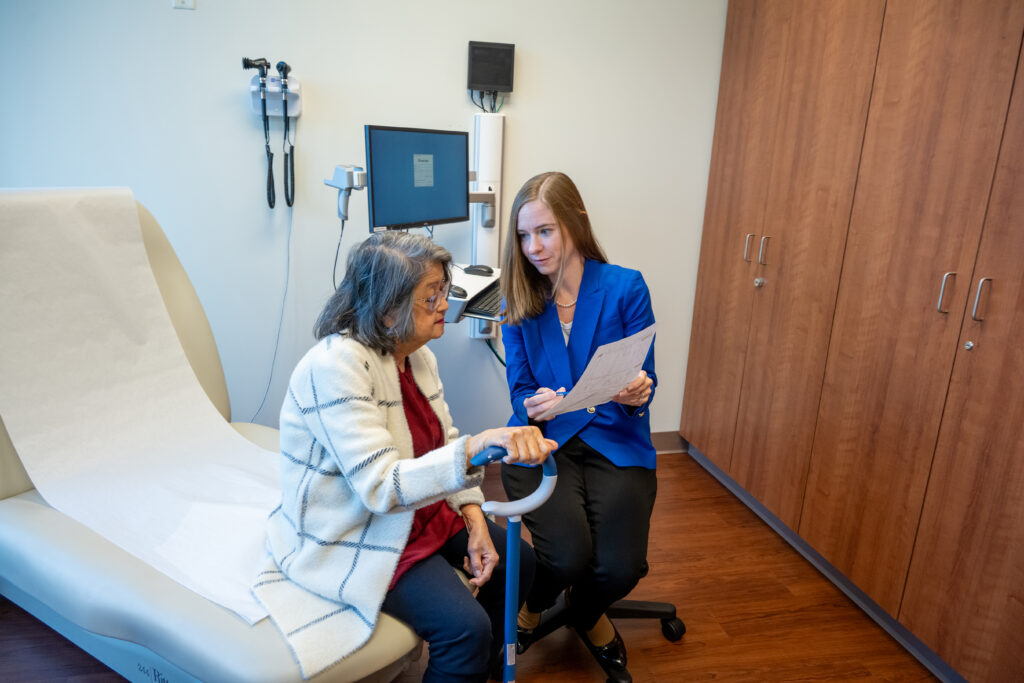
Steven Blackburn is a freelance writer with more than 10 years of journalism experience in various fields, including U.S. education and Connecticut community interest stories. He lives in Winsted.



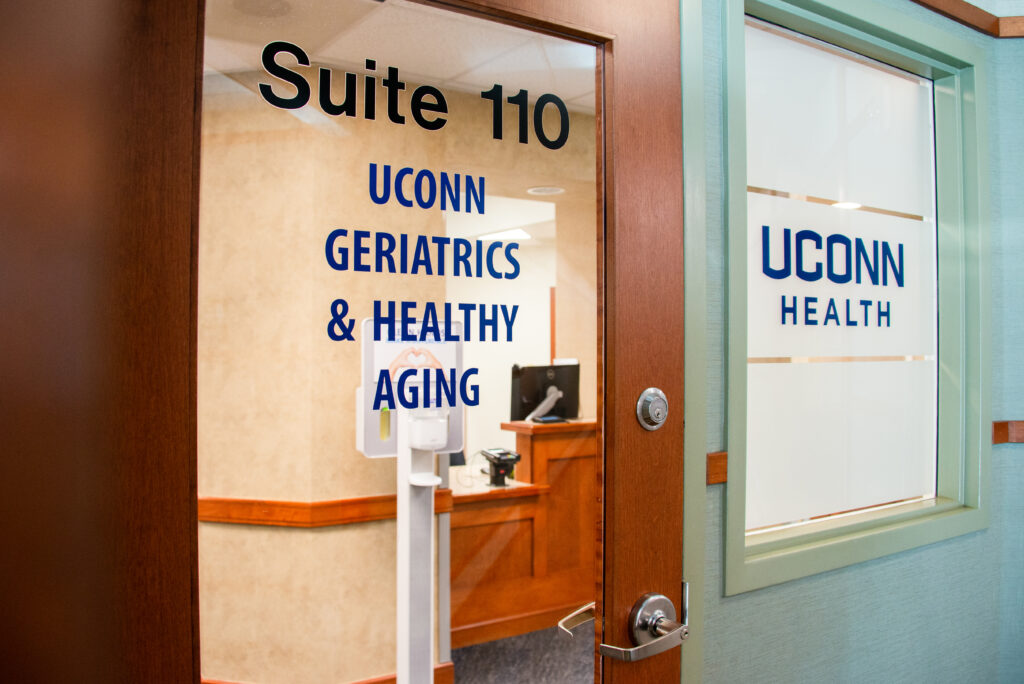


More Stories
Jamie Shawver, D.O.: The Modern-Day Family Doctor
Leading in Urologic Oncology: Ryan Dorin, M.D., Works on Expanding Patient Care
UConn Health Stands at the Forefront of Comprehensive Sickle Cell Treatment in the U.S.